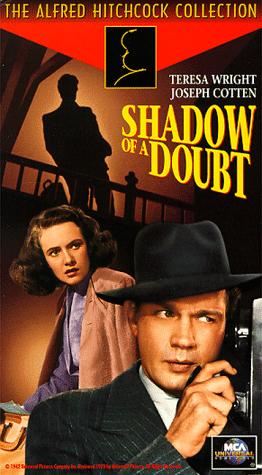No one would ever accuse Alfred Hitchcock's "Shadow of a Doubt" of being plausible, but it is framed so distinctively in the Hitchcock style that it plays firmly and never breaks out of the story. Later you question the absurdity of two detectives following a suspect from New York to California, apparently without being sure of how he looks, and hanging around idly outside his residence for weeks while chatting up the suspect's niece; one of them eventually even proposes marriage. Nor are we convinced that the niece, believing her uncle is a killer of old ladies, would allow him to buy her silence by promising to leave town (because his guilt would "destroy her mother").
One of Hitchcock's favorite
subjects was The Innocent Man Wrongly Accused. In "Shadow of a
Doubt," there's no possibility of innocence. It's clear from the outset
that Uncle Charlie (Joseph Cotten) is the notorious "Merry
Widow Killer," and more than once Hitchcock cuts to nightmarish fantasies
of (presumably) merry widows waltzing. We first see Charlie lying on top of his
bed, smoking a cigar, when told by his landlady two men had been asking for
him. He sees them standing on the corner downstairs, packs a bag with cash,
leaves the house and boldly walks right past them. This demonstrates they don't
know what he looks like, but not why they wouldn't be interested inanyman
leaving the boarding house. The incompetence, and apparently unlimited expense
account, of these two cops is one reason the action can span several weeks.
Charlie's peppy niece Charlotte (Teresa Wright), nicknamed "Young
Charlie" after her uncle, has idolized him for years, and complains to her
family that life wouldn't be so dull if he paid them a visit. Amazingly, that
day they receive a telegram telling them to expect him. In a well-known shot
Hitchcock shows Charlie's train arriving beneath an ominous cloud of black smoke.
He has arrived in Santa Rosa, California, a paragon of small towns that could
have modeled for Norman Rockwell'sSaturday Evening Postcovers.
The town and the Newton family play
major roles in the film, and may reveal Hitchcock's own inner feelings. He shot
in late 1941 and early1942, at the outset of World War II, at a time when he
was unable to visit his dying mother in London because of wartime restrictions.
He later credited the friendliness of the town for making this the most
pleasant of all his film locations. His emphasis on the comfy Newton home, a
chatty neighborhood, a corner cop who knows everyone's name, the nightly meals
around a big dining table--all add up to a security that both he and Uncle
Charlie were seeking, and Charlie rhapsodizes about the joys of home and
family. The visiting uncle is so quickly embraced by the town there is even a
ceremony in his honor.
What we begin with, then, is the innocent Newton family and the sinister
uncle, who moves into Young Charlie's room at the top of the stairs. Also in
the family are her father Joseph (Henry Travers), her mother Emma (Patricia Collinge), and her young sister Ann
(Edna May Wonacott) and brother Roger (Charles Bates). Travers was in his late
60s and Collinge around 50 when the film was made, and they look on the old
side for Ann and Roger's parents but about right for the movie's apple pie
symbolism. The next door neighbor, who drops in without knocking, is Herb (Hume Cronyn, in his movie debut). He and
Joseph are crime buffs and spend much time in debates about methods of
committing a perfect murder. Their asides are funny in themselves, and more so
because of Uncle Charlie's discomfiture. His preferred method is strangulation
with his bare hands.
for the rest go here:http://www.rogerebert.com/reviews/great-movie-shadow-of-a-doubt-1943
for the rest go here:http://www.rogerebert.com/reviews/great-movie-shadow-of-a-doubt-1943


1 comment:
This is one of the scariest movies I have ever seen.
Post a Comment